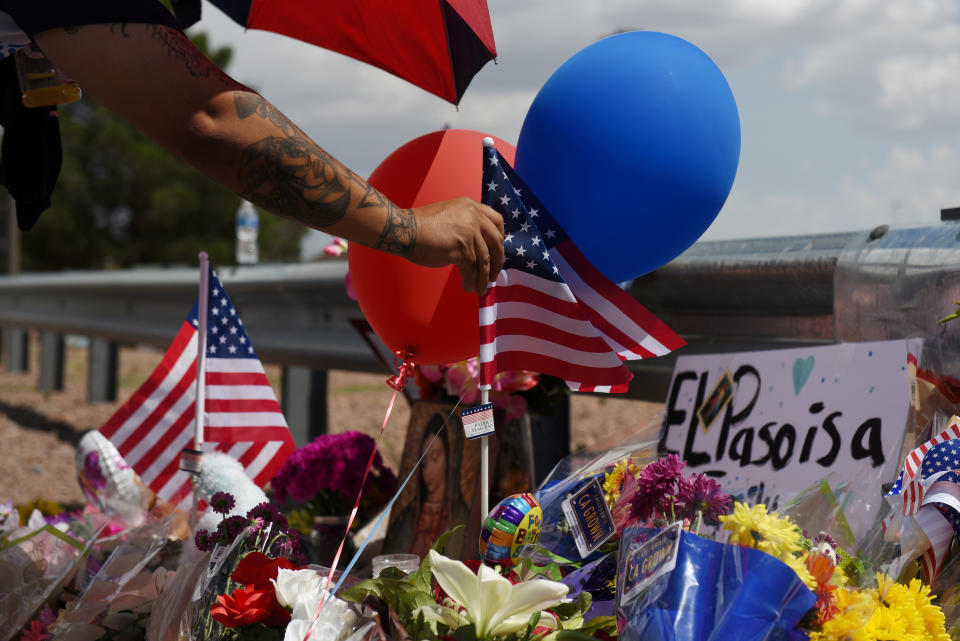Neil deGrasse Tyson responds to backlash over his response to mass shootings: 'I got this one wrong'
- Oops!Something went wrong.Please try again later.
Neil deGrasse Tyson is speaking out after a tweet he posted in response to the mass shootings in El Paso, Tex. and Dayton, Ohio sparked outrage with its suggestion that those mourning were letting their “emotions respond more to spectacle than to data.” To support his argument, the astrophysicist compared the death toll from last weekend’s shootings to those caused by the flu, suicide, car accidents and the like. (Though Tyson said a total of 34 deaths had occurred over 48 hours, the death tolls from El Paso and Dayton amounted to 29 people at the time of his tweet, though El Paso police have just confirmed two more deaths there, bringing the current total to 31 lives lost in the two shootings.)
In the past 48hrs, the USA horrifically lost 34 people to mass shootings.
On average, across any 48hrs, we also lose…
500 to Medical errors
300 to the Flu
250 to Suicide
200 to Car Accidents
40 to Homicide via Handgun
Often our emotions respond more to spectacle than to data.— Neil deGrasse Tyson (@neiltyson) August 4, 2019
Though he has yet to delete the tweet — which one critic blasted as “tone-deaf and cold” — Tyson did issue an apology on Facebook, insisting that his message was intended to “help shape conversations and reactions to preventable ways we die.” After being accused of insensitivity in the wake of a national tragedy, he acknowledged that his data was “unhelpful.”
“Yesterday, a tweet I posted in reaction to the horrific mass shootings in America over the previous 48 hours, killing 34 people, spawned mixed and highly critical responses,” he wrote.

“If you missed it, I offered a short list of largely preventable causes of death, along with their average 2-day death toll in the United States. They significantly exceeded the death toll from the two days of mass shootings, including the number of people (40) who on average die from handgun homicides every two days.
“I then noted that we tend to react emotionally to spectacular incidences of death, with the implication that more common causes of death trigger milder responses within us.
“My intent was to offer objectively true information that might help shape conversations and reactions to preventable ways we die. Where I miscalculated was that I genuinely believed the tweet would be helpful to anyone trying to save lives in America. What I learned from the range of reactions is that for many people, some information — my tweet in particular — can be true but unhelpful, especially at a time when many people are either still in shock, or trying to heal — or both.
“So if you are one of those people, I apologize for not knowing in advance what effect my tweet could have on you. I am therefore thankful for the candor and depth of critical reactions shared in my Twitter feed,” he concluded. “As an educator, I personally value knowing with precision and accuracy what reaction anything that I say (or write) will instill in my audience, and I got this one wrong.”
While some accepted his apology — “don't ever apologize for being the smartest person in the room,” one fan responded — many found it insufficient.
“I’m sorry for the way you responded my tone deaf and insulting comments.”
— Nicole, Great Looking and Smart True Stable Genius (@NoNameGirl8686) August 5, 2019
I hope you know that your constantly trying to show everyone how smart and cool you are only shows how much you're insecure about yourself.
Especially when you see a loss of human lives and your first thought is "this is a great chance to point out my knowledge of statistics".— DYED™ 🇮🇹 (@PotaDlayer) August 5, 2019
Yeah this apology just doesn’t cut it for me. It’s a shame because I always really liked him
— LGBTQ Atheist 🏳️🌈 🧬 (@lgbtq_atheist) August 5, 2019
It was a very insensitive response to tragedy, as a great science communicator you have a responsibility to be more thoughtful, I am very disappointed
— 💧 Ian Musgrave (@ianfmusgrave) August 5, 2019
"So if you are one of those people, I apologize for not knowing in advance what effect my Tweet could have on you." LOL, my favorite type of apology. Im sorry you felt offended but not that I did what offended you. Nice Neil.
— Will Mac (@Evollove19Mac) August 5, 2019
Am sorry that some of you were upset about my idiotic, tone deaf, entitled tweet is not an apology.
— Yoni Freedhoff, MD (@YoniFreedhoff) August 5, 2019
Read more from Yahoo Lifestyle:
Coffee shop employee says she was fired for criticizing employee’s Trump 2020 pin
Man says he was attacked for wearing 'Make America Great Again' hat
Follow us on Instagram, Facebook, Twitter and Pinterest for nonstop inspiration delivered fresh to your feed, every day.


